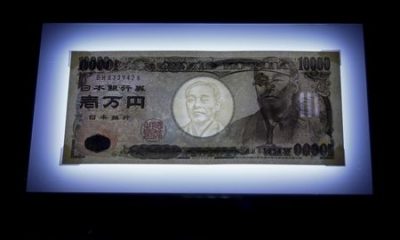Stock Markets
Morgan Stanley: bear market rally to continue

One of Wall Street’s best-known bears, Michael Wilson, thinks the S&P 500 will rise another 7% before turning down, so the bear market rally will continue for now, writes Market Watch.
After the Dow Jones, S&P 500 and Nasdaq Composite joined their strongest weekly gains since at least May last Friday, Wilson, who is chief strategist and head of U.S. equity markets at Morgan Stanley (NYSE:MS), told clients that there could be another 5% to 7% before the downward trajectory of U.S. stocks resumes during the latest bear market recovery.
Wilson has held a bearish view of the stock market for about 2 years and correctly predicted a sell-off this year.
Wilson explained in a research note sent out to clients on Monday that a pullback in the 38-50% drop in the stock market this year “would not seem like something unnatural, not consistent with the previous bear market rally.”
While growth concerns have triggered a sell-off in commodities and lowered inflation expectations, the fact that the U.S. economy is already slowing and heading toward recession means that any market rally is likely to be short-lived, and U.S. stocks are likely to eventually fall.
Wilson mentioned in the note that the bear market is not over yet, although it may appear otherwise in the next few weeks as the market takes the rate cut as a sign that the Fed can still manage a “soft landing” and prevent a meaningful revision to earnings forecasts.
U.S. stocks rose last week as investors now hope the slowing economy and falling commodity prices may inspire the Fed to raise interest rates less sharply. Federal funds futures, a derivative used by investors to bet on the pace of the Fed’s monetary policy changes, estimate with a high probability that the Fed will be forced to start cutting interest rates again as soon as next summer.
They also consider the lower peak in the federal funds rate: it will peak around 3.5% at the end of 2022 instead of 3.75% just a couple of weeks ago. Wilson also pointed out the drop in Treasury yields: the 10-year Treasury bond yield went from 3.230% to a low of 3.07% on Friday before rebonding again on Monday.
Wilson expects the S&P 500 index to fall to around 3,400 points if the U.S. Federal Reserve manages to get a “soft landing” for the economy — which Fed Chairman Jerome Powell said last week would be “a very difficult thing to do.”
Wilson expects that if the U.S. economy plunges into recession, the S&P 500 index will fall to around 3,000 points. In any case, Wilson believes that U.S. stocks are still highly valued because the risk premium — that is, the measure of compensation that investors receive for the extra risk of owning stocks instead of bonds — remains about 300 basis points higher than the 10-year Treasury bond yield, which is considered a “risk-free rate.”

Stock Markets
Avient Corp Announces Senior VP retirement and agreement

Avient Corporation (NYSE:AVNT), a specialist in plastics and advanced polymer materials, today disclosed the retirement of a key executive and the related compensatory arrangements. Michael Garratt, Senior Vice President and President of Color, Additives & Inks – EMEA, has decided to retire. The company’s Board of Directors has agreed to continue the vesting of Mr. Garratt’s outstanding long-term incentive awards post-retirement, as per the terms of those awards.
The arrangement, which includes an extension of Mr. Garratt’s post-employment non-competition and non-solicitation covenants for an additional year, comes in exchange for a release of claims from Mr. Garratt. Additionally, he has committed to providing support during the transition period following his departure.
Avient, formerly known as PolyOne Corp, has its headquarters in Avon Lake, Ohio, and operates under the Industrial Applications and Services organization. The company ended the fiscal year on December 31, and as of the latest report, continues to be listed on the New York Stock Exchange.
Avient’s announcement does not detail the reasons for Mr. Garratt’s retirement nor the specifics of the transition plan. The company’s business address and contact information remain unchanged, and it continues to operate in the SIC category of Plastics, Materials, Synth Resins & Nonvulcan Elastomers.
In other recent news, Avient Corporation has made significant strides, with its first-quarter earnings surpassing expectations and an increased outlook for the rest of 2024. The company’s adjusted earnings per share came in at $0.76, outperforming guidance by $0.08, mainly due to robust sales in Defense applications and the advantage of raw material deflation. Despite a slight 1.5% dip in organic sales and challenges in Europe, Avient’s leadership remains optimistic about demand improvements across all regions.
In addition to its earnings report, Avient announced a quarterly cash dividend of $0.2575 per share, underscoring its ongoing commitment to shareholder value. The dividend is scheduled to be paid to shareholders who are on record as of June 21, 2024.
InvestingPro Insights
In light of the executive transition at Avient Corporation, investors may find additional context in the company’s financial metrics and market performance valuable. Avient boasts a solid track record of raising dividends, having done so for 13 consecutive years, which aligns with its reputation for maintaining dividend payments over 14 years. This consistency is a testament to the company’s financial stability and commitment to shareholder returns, even as it undergoes strategic management changes.
InvestingPro data reveals that Avient has a market capitalization of $4.07 billion and is currently trading at a P/E ratio of 23.1, reflecting investor confidence in its earnings potential. Additionally, the company’s stock is trading near its 52-week high, which could indicate market optimism about its growth prospects. With a dividend yield of 2.31%, Avient offers an attractive return for income-focused investors. It’s also noteworthy that analysts expect net income growth this year, which may be an encouraging signal for potential investors considering the company’s future performance post-executive transition.
For those seeking deeper insights, InvestingPro provides further tips on Avient, including an analysis of its earnings multiple and stock volatility. To explore these additional InvestingPro Tips and make informed investment decisions, use coupon code PRONEWS24 to get up to 10% off a yearly Pro and a yearly or biyearly Pro+ subscription.
This article was generated with the support of AI and reviewed by an editor. For more information see our T&C.
Stock Markets
Castor Maritime expands fleet with Ultramax vessel purchase

Castor Maritime Inc., a global shipping company specializing in the transportation of freight, announced today the acquisition of an Ultramax dry bulk vessel. This strategic move is part of the company’s ongoing effort to enhance its fleet amid the evolving demands of the maritime freight industry.
The acquisition was formalized on Thursday, with Castor Maritime revealing the agreement details in a press release, which is now incorporated by reference into the company’s registration statements on Form F-3. Although the financial terms of the deal were not disclosed in the press release, the purchase aligns with Castor Maritime’s growth strategy and its commitment to increasing shareholder value through fleet expansion.
The Ultramax vessel, a type of dry bulk carrier, is designed for the efficient transport of commodities such as grains, coal, and iron ore. These vessels are favored for their size and versatility, which allow them to access a wide range of global ports, enhancing their operational flexibility.
The announcement follows a series of fleet expansions by Castor Maritime, which is listed under the deep sea foreign transportation of freight industry (SIC 4412). The company’s proactive approach to fleet development signifies its responsiveness to the market’s dynamic conditions and its pursuit of opportunities to bolster its service offerings.
Castor Maritime’s executive leadership, including Chairman, CEO, and CFO Petros Panagiotidis, has expressed confidence in this strategic direction, emphasizing the importance of adapting to industry trends and customer needs. The purchase of the Ultramax vessel is expected to contribute to the company’s competitive positioning in the international shipping sector.
Investors and stakeholders of Castor Maritime can refer to the company’s Form 6-K filing for further details on the transaction. The information based on the SEC filing highlights the company’s transparent communication with the market and its adherence to regulatory requirements.
As Castor Maritime continues to navigate the global shipping landscape, this latest acquisition marks another step in its mission to maintain a modern and diverse fleet, capable of meeting the varied demands of its international clientele.
In other recent news, Castor Maritime Inc., a global shipping company, has been active in adjusting its fleet. The company announced the acquisition of an Ultramax dry bulk carrier vessel for $25.5 million, marking its entry into the Ultramax segment. The transaction is expected to conclude in the third quarter of 2024, further augmenting Castor Maritime’s fleet to 11 vessels.
On the flip side, the company has also finalized the sale of the M/V Magic Vela, a Panamax bulk carrier, for $16.4 million. This transaction is projected to bring a net gain of about $2.7 million to the company’s financial results for the second quarter of 2024, excluding any transaction-related expenses.
These recent developments reflect Castor Maritime’s strategy to optimize its operations and adjust its fleet size and composition in response to market conditions and operational needs. The company is actively seeking opportunities to modernize its fleet while also making strategic sales, as evidenced by the sale of the M/V Magic Vela and the earlier sale of the M/V Magic Horizon.
InvestingPro Insights
In light of Castor Maritime Inc.’s recent strategic acquisition, key financial metrics and market performance data from InvestingPro provide valuable context for investors. The company currently holds a market capitalization of $45.99 million and boasts an impressive gross profit margin of 54.22% over the last twelve months as of Q1 2023. This indicates a strong ability to manage costs relative to revenues, a crucial factor in the capital-intensive shipping industry.
Additionally, Castor Maritime trades at a low Price / Book multiple of 0.1, suggesting that the stock may be undervalued compared to the company’s book value. This, coupled with the fact that the company’s liquid assets exceed its short-term obligations, presents a picture of financial stability and potential for growth.
Investors may also take note of Castor Maritime’s performance over the last three months, which has seen a robust return of 47.37%, reflecting positive market sentiment following strategic moves like the recent vessel acquisition. For those looking for more in-depth analysis, InvestingPro offers a comprehensive set of InvestingPro Tips, including two particularly relevant to Castor Maritime: the company holds more cash than debt on its balance sheet and has been profitable over the last twelve months.
To explore all the tips available, including six additional insights, visit https://www.investing.com/pro/CTRM and consider using the coupon code PRONEWS24 to get up to 10% off a yearly Pro and a yearly or biyearly Pro+ subscription.
This article was generated with the support of AI and reviewed by an editor. For more information see our T&C.
Stock Markets
BioSig Technologies Improves Balance Sheet, Announces Reduction in Outstanding Payables during Q2 2024

Los Angeles, CA 90025, July 25, 2024 (GLOBE NEWSWIRE) — BioSig Technologies, Inc. (OTCQB: OTC:) or (BioSig or “Company”), a medical technology company delivering unprecedented accuracy and precision to intra-cardiac signal visualization, is pleased to announce that it has successfully negotiated with multiple vendors an initial reduction in accounts payable of approximately $1.5 million during the second quarter of 2024 since new management has taken leadership.
One substantial savings recognized is for the successful termination of the office lease expense for the former headquarters in Westport, Connecticut as of July 15, 2024 which was set to end on December 31, 2024.
The Company also plans to work with additional vendors to continue this reduction going forward and will update shareholders appropriately. The reduction will profoundly impact the Company’s financial standing and improve its balance sheet substantially.
BioSig’s CEO, Anthony Amato stated, Maintaining a strong and flexible balance sheet is a priority for our new management team. In a difficult market for companies like ours, we look for other ways to help our company and its shareholders. This reduction will provide more flexibility in evaluating opportunities that arise. We appreciate the time and patience of our vendors and acknowledge their help in putting BioSig in a much better financial position.”
About BioSig Technologies, Inc. (OTCQB: BSGM)
BioSig Technologies is a medical technology company focused on deciphering the body’s electrical signals, starting with heart rhythms. By leveraging a first of its kind combination of hardware and software, we deliver unprecedented cardiac signal clarity, ending the reliance on ˜mixed signals’ and ˜reading between the lines.’ Our platform technology is addressing some of healthcare’s biggest challenges”saving time, saving costs, and saving lives.
The Company’s product, the PURE EP™ Platform, an FDA 510(k) cleared non-invasive class II device, provides superior, real-time signal visualization allowing physicians to perform highly targeted cardiac ablation procedures with increased procedural efficiency and efficacy.
Forward-Looking Statements
This press release contains “forward-looking statements” within the meaning of the Private Securities Litigation Reform Act of 1995. Such statements may be preceded by the words “intends,” “may,” “will,” “plans,” “expects,” “anticipates,” “projects,” “predicts,” “estimates,” “aims,” “believes,” “hopes,” “potential” or similar words. Forward-looking statements are not guarantees of future performance, are based on certain assumptions, and are subject to various known and unknown risks and uncertainties, many of which are beyond the Company’s control, and cannot be predicted or quantified and consequently, actual results may differ materially from those expressed or implied by such forward-looking statements. Such risks and uncertainties include, without limitation, risks and uncertainties associated with (i) our cost reduction plan and associated workforce reduction or other cost-saving measures not reaching the targeted reduction of cash burn by 50%; (ii) the geographic, social, and economic impact of pandemics or worldwide health issues on BioSig’s ability to conduct its business and raise capital in the future when needed; (iii) BioSig’s inability to manufacture its products and product candidates on a commercial scale on its own, or in collaboration with third parties; (iv) difficulties in obtaining financing on commercially reasonable terms; (v) changes in the size and nature of BioSig’s competition; (vi) loss of one or more key executives or scientists; and (vii) difficulties in securing regulatory approval to market BioSig’s products and product candidates. For a discussion of other risks and uncertainties, and other important factors, any of which could cause BioSig’s actual results to differ from those contained in forward-looking statements, see BioSig’s filings with the Securities and Exchange Commission (SEC), including the section titled Risk Factors in BioSig’s Annual Report on Form 10-K, filed with the SEC on April 16, 2024. Investors and security holders are urged to read these documents free of charge on the SEC’s website at http://www.sec.gov. The Company assumes no obligation to publicly update or revise its forward-looking statements as a result of new information, future events or otherwise, except as required by law.
Todd AdlerBioSig Technologies, Inc.Investor Relations12424 Wilshire Blvd Ste 745Los Angeles, CA 90025tadler@biosigtech.com 203-409-5444, x104Anthony AmatoChief Executive Officeraamato@biosigtech.com203-409-5444 ext. 102
Source: BioSig Technologies, Inc.

 Forex2 years ago
Forex2 years agoForex Today: the dollar is gaining strength amid gloomy sentiment at the start of the Fed’s week

 Forex2 years ago
Forex2 years agoHow is the Australian dollar doing today?

 Forex2 years ago
Forex2 years agoUnbiased review of Pocket Option broker

 Forex2 years ago
Forex2 years agoDollar to pound sterling exchange rate today: Pound plummeted to its lowest since 1985

 Cryptocurrency2 years ago
Cryptocurrency2 years agoWhat happened in the crypto market – current events today

 World2 years ago
World2 years agoWhy are modern video games an art form?

 Stock Markets2 years ago
Stock Markets2 years agoMorgan Stanley: bear market rally to continue

 Economy2 years ago
Economy2 years agoCrude oil tankers double in price due to EU anti-Russian sanctions
































